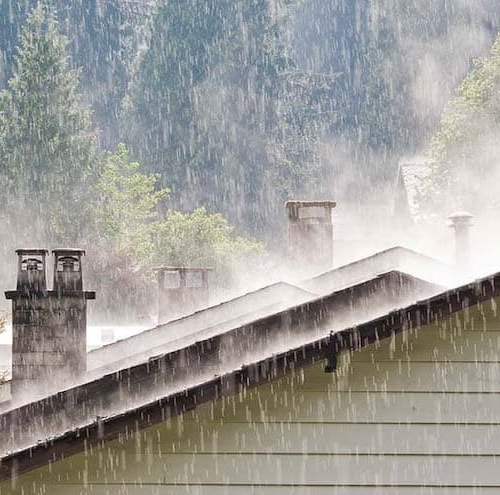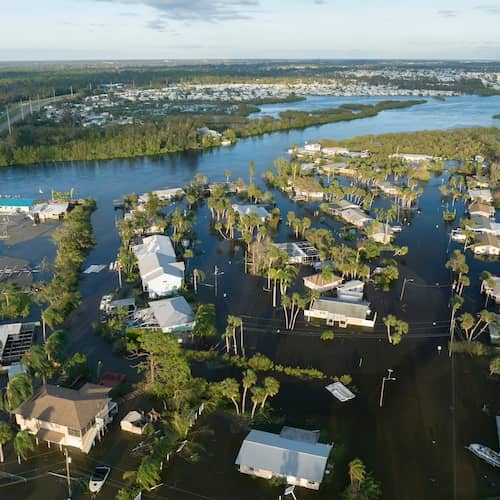What is flood insurance and do you need it?
Contributed by Sarah Henseler
Oct 23, 2025
•3-minute read

Going through a natural disaster is devastating. Realizing afterward that your insurance policy doesn’t cover the damage to your home can make it even worse.
Homeowners insurance provides essential protection, but usually doesn’t cover every scenario. That’s why many homeowners ask: Do I need flood insurance, too?
This guide will help you understand what flood insurance is, when it’s required, and why it can be an important layer of protection for your home and belongings.
What does flood insurance cover?
Flood insurance offers protection from damage caused by flooding. It is a separate insurance policy that’s not included in a standard homeowners insurance plan.
Flooding is among the most frequent natural disasters in the U.S. According to FEMA, there’s a 26% chance of experiencing one during the life of a 30-year mortgage. While hazard insurance may cover water damage linked to another event, such as a burst pipe, only flood insurance is meant to handle damage caused directly by flooding.
What isn’t covered by flood insurance?
Many homeowners assume their regular policy will help if water damage occurs, but that’s rarely the case. Standard homeowners' insurance generally does not cover flood-related damage to your home or personal property.
Hazard insurance may cover specific structural issues caused by covered events — for example, a water main break during an ice storm — but it won’t apply to flood damage caused by heavy rain, hurricanes, or storm surge.
Is flood insurance required?
Flood insurance requirements depend on where your property is located and how it’s financed:
- High-risk flood zones: If you’re buying a home in a high-risk flood zone with a government-backed loan, federal law requires flood insurance. Most private lenders will also make it a condition of the loan.
- Moderate- to low-risk zones: Federal law doesn’t require coverage here, but your lender still might. Some homeowners purchase it for peace of mind even if it isn't needed. In these cases, more affordable Preferred Risk Policies (PRPs) are available through the National Flood Insurance Program (NFIP).
Do I need flood insurance?
One of the most common questions homeowners ask is who needs flood insurance and when it’s necessary. If you live in a high-risk flood area, your odds of experiencing a flood are roughly one in four over a 30-year mortgage. Because of that risk, most lenders will require flood coverage.
Even outside those zones, floods can happen anywhere it rains. According to FEMA, just 1 inch of floodwater can result in as much $25,000 in damage to your home.
Homeowners in low-risk areas
From 2014 to 2018, more than 40% of NFIP claims came from homeowners outside high-risk zones. That means living in a lower-risk area doesn’t guarantee safety. The good news is that flood insurance usually costs less in these areas, making it a cost-effective way to protect your home.
Risks can change
Flood risk isn’t fixed. FEMA regularly updates flood maps, and your property could be reclassified. If your area is re-mapped into a high-risk zone, your lender may require that you get flood insurance, even if it wasn’t necessary when you moved in.
Types of flood insurance
There are two main types of flood insurance available:
- National Flood Insurance Program (NFIP): NFIP is managed by FEMA and it offers coverage to homeowners in communities that adopt regulations to reduce flood risks. It’s often the most widely used option for flood protection.
- Private flood insurance: Offered by private companies, these policies may include higher coverage limits, more flexible terms, and shorter waiting periods compared to NFIP policies.
Both NFIP and private flood insurance are designed to protect homeowners from losses that can quickly add up even after minor flooding. NFIP and private insurers may differ in how much policy cover they provide, with private policies sometimes offering higher limits and broader options.
The bottom line: Flood insurance is important to protect your property
Some homeowners still wonder, Should I get flood insurance if my lender doesn’t require it? With the cost of flood damage climbing quickly, the protection is often worth the peace of mind.
Flood insurance isn’t just for people in high-risk areas. With extreme weather becoming more common, it’s a smart way to protect your most significant investment from costly damage. Preparing before disaster strikes also helps ensure added security. Check out our emergency plan for your home to ensure you and your property are ready for the unexpected.
If you’re unsure about coverage or what your lender might require, get in touch with a Rocket Mortgage Home Loan Expert to explore your options and protect your home.

Sam Hawrylack
Samantha is a full-time personal finance and real estate writer with 5 years of experience. She has a Bachelor of Science in Finance and an MBA from West Chester University of Pennsylvania. She writes for publications like Rocket Mortgage, Bigger Pockets, Quicken Loans, Angi, Well Kept Wallet, Crediful, Clever Girl Finance, AllCards, InvestingAnswers, and many more.
Related resources

7-minute read
Disaster preparedness plan and checklist
A natural disaster can destroy years of hard work in seconds. Prepare for the unexpected with an emergency plan for home to help minimize destruction.
Read more

9-minute read
Filing a homeowners insurance claim after a natural disaster
If you’re thinking about filing a homeowners insurance claim to repair your house in the wake of a natural disaster, you may wonder, “Does home insu...
Read more
7-minute read
How to recover after a natural disaster: A guide
Recovering from a natural disaster is a tough process. Read our guide for how to put the pieces back together and recover after disaster strikes.
Read more